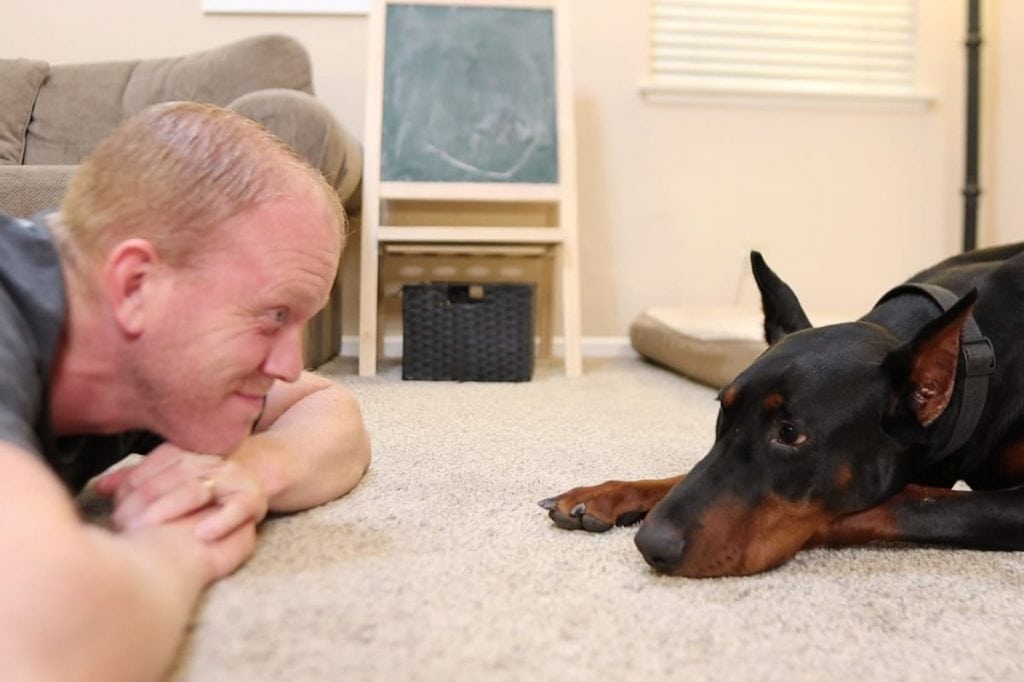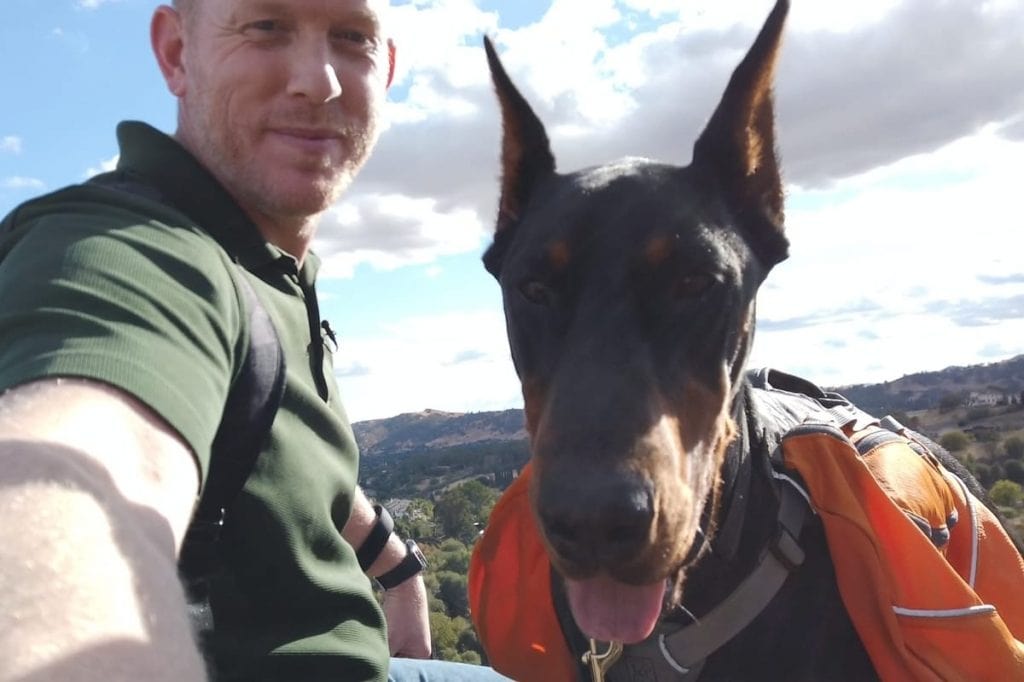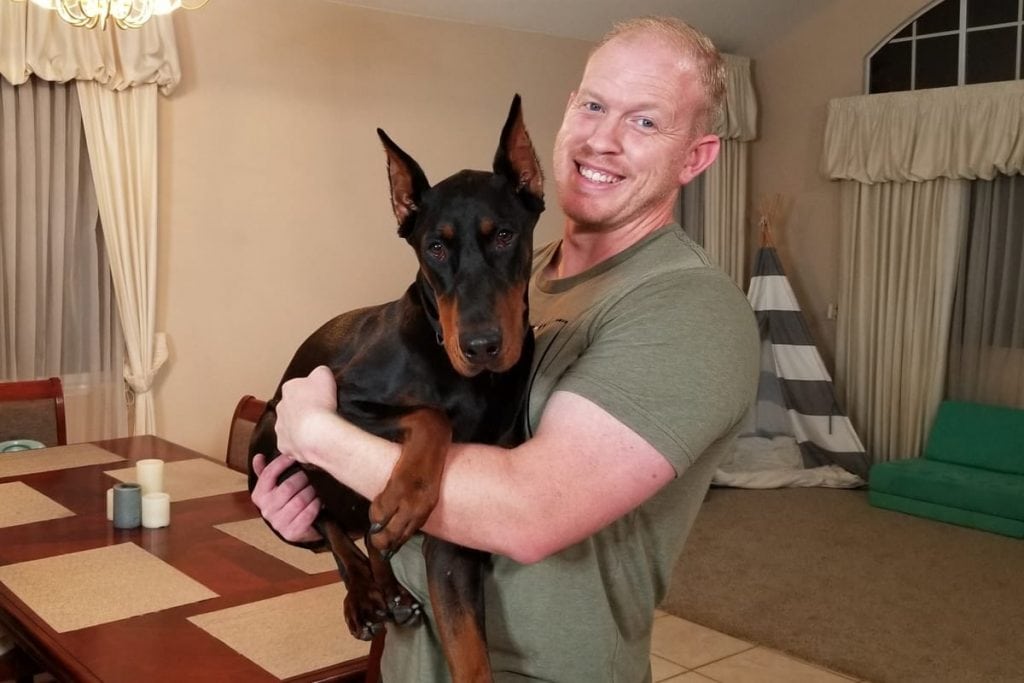
Dobermans are known for bonding extremely tightly with their owners. Of course, that’s only if the owner has made an effort to bond to their Doberman in a way that this unique breed is receptive to. Yes, your Doberman is inclined to naturally bond with you, but there are some actions you can take that appeal to this breed’s natural instincts that’ll help ensure a tight bond builds between you too very quickly and stays for years to come.
As a Family Doberman Specialist, I’ve helped many families to bond with their Dobermans in a way that appeals to this breed’s natural instincts. Below are some of the best methods I’ve come across. Many of these Doberman owners have been using these methods for years to really develop that deep, lasting connection with their dogs.
1. Sleep Close Together
Dobermans, especially young Dobermans, love sleeping close to their owners. This is why Doberman puppies love sleeping in tight groups with their brothers and sisters in the litter. It provides them with a sense of security and is more or less their “happy place”.
This is especially true when they are winding down for the night and their instincts are telling them to find a safe place for the night. It’s also a constant reminder for the attention-needing Dobermans that they are close to their owner and “a part of the pack”.
Don’t be offended though if your Doberman’s natural instinct to protect you takes over and they reposition themselves with their back to you facing the door (or entryway) into the room where you’re sleeping. This doesn’t mean your Doberman is any less bonded with you, it simply means they are in protection mode. Dobermans do this much more often when they are sleeping in a new environment.
2. More Involvement in Your Daily Life
The more you integrate your Doberman into your daily life, the more he or she will naturally develop a deep bond with you. I’ve seen this time and time again with my clients. When an owner starts making arrangements to bring their dog to work with them, or to the outdoor market they frequent, or a mother starts bringing their Doberman to pick up the kids from school, many amazing things can result in the relationship between owner and Doberman.
First, the bond you two have will naturally deepen, but they will also feel more integrated into your daily life and routine (more on routine in a bit). This has other great side effects like reducing anxiety in your dog overall, resolving destructive chewing issues, reducing unwanted barking, and a lot more.
So get creative and see what parts of your life you can integrate your Doberman into. They’re called “velcro” dogs for a reason. They always want to be by your side no matter where you are. Plus, exposing them to new people and experiences does wonders for keeping your Dobie well-rounded, calm, and well-socialized.
3. Play a Game Together
Dobermans are working dogs and they instinctually bond with others who are a part of whatever “job” they feel they need to accomplish. So make yourself a part of that by creating a job for your dog in the form of a new game to play together. This can be something simple like fetch or something where they need to engage their mind like playtime with a puzzle toy.
One of my favorites that’s really easy to do with a Doberman is a game of “hide and seek”. Dobermans are naturally inclined to excel at this game since they naturally seek out their owners, they have amazing scenting capabilities, and they’re trainable enough to teach the rules of this game to easily. Plus it also engages their mind.
Have your dog “sit” and “stay”. They run off and hide somewhere in your house. Yell out a release command and wait for your Doberman to find you. When he (or she) does, reward with a treat and heavy praise. It’s ok to give some verbal encouragement to find you initially, but after a couple of repetitions of this, your dog should have the concept of this game down. If you need help training the basic commands I mentioned, feel free to check out the Doberman training guide which will help you with that.

4. Experience Something New Together
Finding a new experience with your Doberman is a great way to deepen your bond. Most “new experiences” involve what will feel like some sort of task for your Doberman to accomplish, which they love, even if it’s just watching the environment and keeping you safe.
You can take your Doberman on a hike, to a dog show, or out to the lake. These things help your dog become more socialized and will even help reduce the chances of reactivity to people and objects in their daily life. But more importantly, it helps you to bond with your dog.
5. Increase Physical Touch
Dobermans love simply interacting with their owners. Since they’re the only dog breed in the world that was created for the purpose of personal protection of humans, they’re also instinctually inclined to want that closeness to their owners. By physically touching your Doberman more often, you’re deepening your bond and also “communicating” with your dog through touch, even if you don’t mean to.
These things really do satisfy a long list of natural desires the Doberman has and increasing the amount of physical touch between you and your Doberman is one of the absolute quickest ways to bond tighter together.
You can simply pet your Doberman more, lay on the couch, play with their ears, play with their feet, and so on. Gently touching your Doberman while he (or she) is asleep is actually a great way to make sure your dog is steadfast and calm around children. It’ll also make doing things where your dog will be touched in strange ways, like nail trimming and vet visits, much easier.
6. Dedicated Training Times
Having dedicated training times every day with your Doberman is a great way to build your bond together, build your role as the leader of the house, and increase the list of commands and behaviors your Doberman knows. It also satisfies Dobermans mentally since they are working to figure out what you’re asking of them.
Even something as short as 10-minute training sessions one or two times per day will make a huge difference in your bond with your Doberman and their overall behavior in the house. These training times are a great time to teach your dog new commands or work on reinforcing commands they already know.
7. Accomplish a Task Together
As one of the premier working breeds, Dobermans absolutely love having a task to accomplish. It gives them a deep sense of accomplishment and purpose. They are also naturally apt at it. You’ll really see this when they’re performing a task they’re familiar with. Accomplishing a task together with your Doberman will help you tap into their natural instincts and bond with them through the use of this drive that’s naturally already ingrained in them.
You can do things like retrieving the newspaper together off-leash, performing a daily “perimeter” check of your property by walking along your fence line (Dobermans absolutely love this), or playing hide and seek with a family member where you and your Doberman work together to find the person hiding.
Even something as simple as taking a daily walk around the block can be seen by your Dobie as a “task” that you’re accomplishing together. Be creative and keep the activity fun so your dog is always looking forward to it.
8. Develop a Predictable Routine
Dobermans are strong habit-forming dogs and having a predictable routine (that involves you, the owner) is a great way the develop a close bond with your dog. Routine by itself helps to provide your Doberman with a sense of security and lower their overall anxiety levels. They’ll know for certain when they’ll be fed and when they’ll be spending time with you. These are points of stress in a Doberman’s life.
Make a well-thought-out routine with your Doberman and try to keep it as consistent as possible. It’s ok if it changes from time to time but try to make any major changes to the routine gradual so the transition is easier on your dog.
9. Frequent Communication
Since these dogs are extremely in-tune with their owners, they thrive off frequent communication. This is one of the few dog breeds that will look you directly in the eyes while you’re talking to them, and maintain eye contact. Use this human-focused nature of the Doberman as a way to bond deeper with your dog.
Talk to your Doberman often, give them feedback on what they’re doing by simply saying “good boy!” or “no, don’t touch that”. Simple phrases are understood more often than you might expect by a highly intelligent dog like the Doberman. Frequently communicating with your Doberman gives them that interaction with you that they desire so incredibly much and takes advantage of yet another instinct of theirs to build your relationship together.
How to Tell if Your Doberman Is Bonded to You
The more you work at creating a deep, meaningful bond with your Doberman, the more you may notice a few changes in his or her behavior. There are many, sometimes subtle, actions your Doberman will take that indicate they have bonded tightly with you. Below are some examples.
- Look Into Your Eyes with Nose Forward and Ears Back – This is a common way that a Doberman will “listen” to what you’re saying. But this particular pose is one where your dog is reaching their most sensitive body part out to you (their nose) and trying to get closer while listening.
- Try to Get Progressively Closer to You – This often happens when you’re relaxing on the couch with your Doberman, or after you allow your Dobie up on the bed with you. If they’re carefully trying to get progressively closer to you, it is a sign they are deeply bonded to you.
- Randomly Lean Against Your Legs – This is similar to the point above since it has to do with how these dogs need that constant closeness with an owner to whom they’re bonded tightly to. This will often happen at inopportune times though, like when you’re cooking in the kitchen or trying to clean the house.
- Won’t Leave Your Side, Even in the Bathroom – If your Doberman follows you everywhere around the house, even trying to force their way into the bathroom with you, then it’s a good sign they re bonded tightly to you. This is often more than just separation anxiety and is actually a display of that tight bond you have.
- Frequently Check-in with You in New Environments – If your Doberman is consistently looking back at you, or “checking in” with you while you’re somewhere new (or out in public), then it’s a sign that they’re bonded to you. Your dog is essentially checking on you for a sense of security and this only happens if you have a deep bond.
There are many more ways you can tell your Doberman is bonded with you, or even loves you. I give a rundown of 25 different ways Dobermans naturally show their love and bond to their owners in my article Does Your Doberman Love You? 25 Ways They Show Affection.

Bonding to One Person vs. A Whole Family
As a general rule, and as compared to many other dog breeds, Dobermans generally bond a little tighter to one specific person in the household. With male Dobermans however, this is almost not noticeable as they’re generally pretty welcoming of others and do very well in family settings.
Female Dobermans are a bit more obvious about their favorite person in a household and seem to bond better to one specific person. It’s not to say that females won’t bond with others in the house, it’s just that they’ll have that one person they are always checking in on, quicker to respond to when called, and most likely to be hanging around if given the choice.
There are actually many behavioral differences between male and female Dobermans and I give a rundown of these differences in my guide to the differences between male and female Dobermans.
Bonding with Young Dobermans
Puppies, especially those between 8 to 12 weeks of age, but really any Doberman under about one year of age, is much easier to bond with than an adult Doberman. This breed will naturally bond with an owner early on (a left-over survival instinct) and have trouble bonding with other owners or handlers down the road (should they change homes, for example). This is one reason Dobermans aren’t used as often in military and police roles anymore—they have difficulty changing handlers.
The quickest way to bond with a Doberman puppy is to regularly provide them with a sense of security. Providing a sense of security to a young Doberman puppy who is away from his or her siblings and mother will instinctually cause them to bond tightly to that person providing that security.
To bond with a young Doberman, you should also interact with it regularly, and it certainly helps if you are the one who feeds the dog as well. Really there isn’t much specific you need to do to bond with a young Doberman since they instinctually bond so quickly at a young age.
Bonding with Older Dobermans
While it’s easier to bond with a younger Doberman fast, it’s certainly still possible to build a tight bond with older Dobermans as well. This is most obvious to those who adopt or rescue older Dobermans. While they may be bonded to their previous owner, they can still develop a strong bond with their new owner with a little work.
Providing an older Doberman with a sense of security, purpose, and companionship, is the quickest way to bond with them especially if they’re in a new environment. Develop a predictable routine with your adult Doberman which includes some “tasks” to accomplish together. Even if this is a simple daily walk around the block. The routine itself will provide security and the task will give them a sense of purpose. Also, doing the walk together will help with companionship. This helps to develop a deep bond between owner and dog, even with an adult Doberman.


